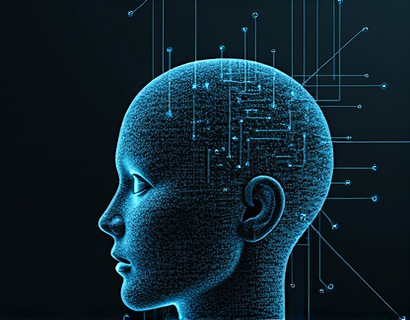Unlocking Specialized Phygital Knowledge: The Power of AI-Driven Chat Interfaces for Educators, Learners, and Young Minds
The integration of artificial intelligence (AI) with digital interfaces has opened new avenues for educational experiences, particularly in the realm of phygital services. This article delves into how AI-powered chat interfaces are revolutionizing the way educators, learners, and young minds access and interact with specialized knowledge about phygital solutions and industry trends. By focusing on content verification and safety, these platforms ensure that the information provided is not only accurate but also suitable for younger audiences.
The Rise of Phygital Solutions
Phygital, a blend of physical and digital, has become an integral part of modern education and industry. Phygital solutions encompass a wide range of services that combine physical products or experiences with digital enhancements. These can include augmented reality (AR) applications, virtual reality (VR) environments, smart devices, and interactive learning tools. As technology continues to advance, the demand for phygital solutions in education and various industries has surged, making it essential for educators and learners to stay informed about the latest trends and developments.
AI-Driven Chat Interfaces: A New Educational Frontier
AI-driven chat interfaces represent a significant leap forward in educational technology. These interfaces use natural language processing (NLP) and machine learning algorithms to understand and respond to user queries in real-time. For educators, these chat interfaces serve as powerful tools to provide students with immediate access to specialized knowledge about phygital services and industry trends. For learners and young minds, they offer an engaging and interactive way to explore complex topics in an accessible manner.
Ensuring Content Verification and Safety
One of the most critical aspects of AI-powered chat interfaces in an educational context is the verification of content. Misinformation can be detrimental, especially when it comes to young learners. Therefore, these platforms implement rigorous content verification processes to ensure that the information provided is accurate, up-to-date, and reliable. This involves cross-referencing data from trusted sources, regular updates by subject matter experts, and user feedback mechanisms to continuously improve the quality of content.
For younger users, safety is paramount. AI chat interfaces are designed with child-friendly interfaces and strict privacy policies to protect user data. Content is tailored to different age groups, ensuring that the information is not only accurate but also age-appropriate. This approach not only enhances the learning experience but also builds trust among educators, parents, and students.
Enhancing Educational Experiences
AI-powered chat interfaces can significantly enhance educational experiences by providing personalized learning paths. By analyzing user interactions and preferences, these interfaces can recommend relevant phygital resources, articles, and interactive tools that align with a student's interests and learning goals. This personalized approach helps in maintaining engagement and motivation, which are crucial for effective learning.
For educators, these chat interfaces serve as valuable resources for lesson planning and professional development. They can quickly access a wealth of information on the latest phygital tools and methodologies, stay updated with industry trends, and find practical examples to incorporate into their teaching. This not only improves the quality of education but also empowers teachers to become more confident and innovative in their roles.
Interactive Learning for Young Minds
Young learners benefit immensely from interactive and engaging educational tools. AI-driven chat interfaces can transform traditional learning methods by introducing interactive elements such as quizzes, games, and simulations. These features make complex concepts more accessible and enjoyable, fostering a deeper understanding and retention of knowledge.
For instance, a chat interface can guide a student through a virtual AR tour of a historical site, providing detailed information at each stop. Alternatively, it can facilitate a VR experiment in a virtual chemistry lab, allowing students to conduct experiments safely and repeatedly. These immersive experiences not only make learning fun but also cater to different learning styles, ensuring that all students can thrive.
Building a Community of Knowledge Seekers
AI-powered chat interfaces can also foster a sense of community among learners and educators. By connecting users with similar interests and goals, these platforms create spaces for collaboration and knowledge sharing. Students can ask questions, share projects, and receive feedback from peers and experts in real-time. This community aspect not only enhances the learning experience but also builds a supportive network that extends beyond the classroom.
For educators, these platforms offer opportunities to connect with colleagues, exchange best practices, and participate in professional development activities. This collaborative environment encourages continuous learning and innovation, which is essential in the rapidly evolving field of phygital solutions.
Addressing Challenges and Future Directions
While AI-driven chat interfaces offer numerous benefits, there are challenges that need to be addressed to fully realize their potential. One major challenge is the continuous improvement of NLP and machine learning algorithms to better understand and respond to diverse user queries. Additionally, ensuring that the content remains relevant and up-to-date requires ongoing efforts from content creators and subject matter experts.
Another important aspect is the integration of these chat interfaces with existing educational systems and tools. Seamless integration can enhance the user experience and make these platforms more accessible. Furthermore, addressing concerns related to digital literacy and ensuring that all users, including those in underprivileged areas, have access to these technologies is crucial for equitable education.
Conclusion
The integration of AI-powered chat interfaces in education represents a transformative shift in how specialized phygital knowledge is accessed and shared. By focusing on content verification, safety, and interactivity, these platforms provide a robust and educational experience for educators, learners, and young minds. As technology continues to evolve, the potential for AI-driven chat interfaces to enhance learning and innovation in the phygital domain is immense. Embracing these tools can lead to a more informed, engaged, and prepared generation of learners ready to tackle the challenges of the future.










































